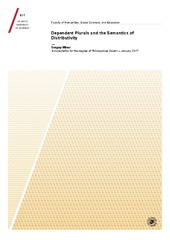| dc.contributor.advisor | Ramchand, Gillian | |
| dc.contributor.author | Minor, Sergey | |
| dc.date.accessioned | 2017-03-10T08:41:10Z | |
| dc.date.available | 2017-03-10T08:41:10Z | |
| dc.date.issued | 2017-03-23 | |
| dc.description.abstract | This thesis focuses on the semantics of distributivity, grammatical number, and cardinality predicates (i.e. numerals and quantity modifiers such as 'several'), and more generally on the way the concept of multiplicity is represented in the semantics of natural language. I argue that constructions involving so-called 'dependent plurals', i.e. plurals lacking numerals or quantity modifiers occurring in the scope of certain quantificational items such as 'all' and 'most', pose a challenge to the classical semantic framework that distinguishes between two sources of multiplicity: domain-level plurality and distributive quantification. Instead, I argue that dependent plural readings should be analysed as distinct both from cumulative readings and distributive readings, in the classical sense. I demonstrate how this can be accomplished in a semantic framework where expressions are evaluated relative to sets of assignments, or plural info states, as originally proposed by van den Berg (1990, 1994, 1996). The specific formal implementation that I propose, PCDRT*, is based on Brasoveanu’s (2007, 2008) Plural Compositional DRT, with a number of significant modifications. In this framework we are able to distinguish between two types of distributivity: weak distributivity across the assignments in a single plural info state and strong distributivity across multiple info states. I argue that both of these types of distributivity play a role in the semantics of natural language, accounting for the contrasting properties of ‘singular quantifiers’, such as 'each' and 'every', and ‘plural quantifiers’, such as 'all' and 'most'. The contrast between bare plurals and plurals involving cardinality modifiers, on the one hand, is captured in terms of the distinction between state-level and assignment- (or domain-) level plurality.
I further argue that the proposed theory is able to handle a range of phenomena particularly problematic for previous approaches, including intervention effects in dependent plural constructions, long-distance dependent plurals, and the contrast between dependent and non-dependent bare plurals in English with respect to their scopal properties. | en_US |
| dc.description.doctoraltype | ph.d. | en_US |
| dc.description.popularabstract | The main focus of this thesis is the concept of multiplicity, and its representation in the semantics of natural language. Human languages possess a variety of means to convey the notion of a multitude of objects being involved in a particular situation, e.g. number marking on nouns, numerals such as ‘three’ and ‘five’, quantificational items such as ‘each’ and ‘all’. The aim of the thesis is to develop a formal semantic framework to account for the interaction between these classes of linguistic items, based primarily on elicited and freely occurring data from English. The general picture that emerges from this investigation is that natural language semantics involves three distinct levels at which the notion of multiplicity can be represented. This approach allows us to explain the semantic contrast between singular quantifiers, e.g. 'each' and 'every', and plural quantifiers, e.g. 'all' and 'most', on the one hand, and between the plural number feature and numerals, on the other. | en_US |
| dc.identifier.uri | https://hdl.handle.net/10037/10529 | |
| dc.language.iso | eng | en_US |
| dc.publisher | UiT Norges arktiske universitet | en_US |
| dc.publisher | UiT The Arctic University of Norway | en_US |
| dc.rights.accessRights | openAccess | en_US |
| dc.rights.holder | Copyright 2017 The Author(s) | |
| dc.rights.uri | https://creativecommons.org/licenses/by-nc-sa/3.0 | en_US |
| dc.rights | Attribution-NonCommercial-ShareAlike 3.0 Unported (CC BY-NC-SA 3.0) | en_US |
| dc.subject | VDP::Humanities: 000::Linguistics: 010::General linguistics and phonetics: 011 | en_US |
| dc.subject | VDP::Humaniora: 000::Språkvitenskapelige fag: 010::Allmenn språkvitenskap og fonetikk: 011 | en_US |
| dc.subject | VDP::Humanities: 000::Linguistics: 010::English language: 020 | en_US |
| dc.subject | VDP::Humaniora: 000::Språkvitenskapelige fag: 010::Engelsk språk: 020 | en_US |
| dc.subject | formal semantics | en_US |
| dc.subject | distributivity | en_US |
| dc.subject | plurality | en_US |
| dc.subject | dependent plurals | en_US |
| dc.subject | quantification | en_US |
| dc.subject | numerals | en_US |
| dc.title | Dependent Plurals and the Semantics of Distributivity | en_US |
| dc.type | Doctoral thesis | en_US |
| dc.type | Doktorgradsavhandling | en_US |


 English
English norsk
norsk
